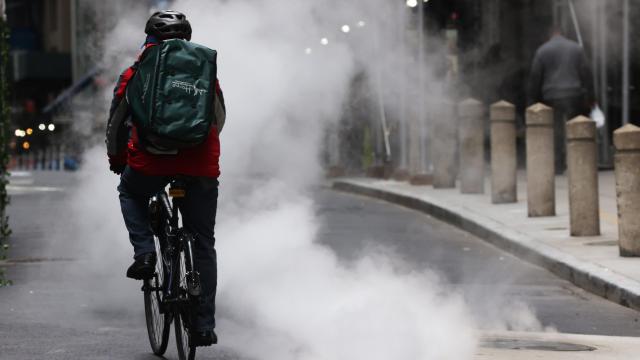A new report surveyed hundreds of delivery workers in New York City and found that many experienced unsteady wages, long hours, theft, and costly injuries. On top of that, they often described harsh treatment from restaurant owners, customers, and even the apps they work with.
The report, titled “Essential but Unprotected,” is the result of a collaboration between researchers at Cornell University’s School of Industrial and Labour Relations and two local advocacy organisations focused on immigrant workers: Los Deliveristas and the Worker’s Justice Project. As part of the report, the authors surveyed 500 app delivery workers in NYC during the pandemic — a time when in-person restrictions on dining and movement led to a surge in delivery work. They also conducted interviews and focus groups.
The most common complaint expressed by delivery workers was low pay. For the average worker, the report estimated their hourly pay was around $US12 ($16). But after excluding tips, the average pay was only $US7.87 ($11) an hour. Tips, as anyone with food service experience knows, can wildly fluctuate from week to week, and to make enough to live on, many people reported working for multiple apps, while about two-thirds reported working six days a week. In any case, $US12 ($16) an hour is still below the $US15 ($20) minimum wage mandated by the city for employers as of the end of 2019 (as with many forms of gig work, app delivery workers are not considered actual employees in New York City, only independent contractors).
Even getting ahold of this meager pay was often a challenge for workers. The survey found that 42% reported experiencing nonpayment, underpayment, and late payment of their wages or tips, sometimes to the point of missing an entire week’s earnings.
“This report validates the workers’ stories, stories that we have heard for many years,” Hildalyn Colón Hernández, director of policy at the Workers Justice Project, told The City.
The precariousness of delivery work manifested in other ways, too.
Many workers complained about the algorithm used by the apps to determine their workflow, for instance. If a worker turned down too many requests or received low customer ratings, they could lose their ranking with the app, leading to worse or fewer time slots available for them. And simple essentials like bathroom breaks are often out of reach for workers. 83% said that they weren’t allowed to use a restaurant’s bathrooms at least some of the time, while 53% reported they could sometimes find an available public restroom, and 30% reported never finding access to one.
Beyond these inconveniences, delivery work can be dangerous. About half of all workers reported getting hurt on the job, usually through bike accidents or crashes, and three-quarters said they had to foot the bill for any related medical expenses. 54% said they experienced bike theft, while 30% said they were assaulted during the theft. The researchers dedicated the report to the memory of delivery workers who died in 2020 and 2021, including one worker who was shot over his bike in March 2021.
There are legislative efforts ongoing to bolster the rights of delivery workers in the city. But it’s unclear when any of the currently proposed regulations, including fines for restaurants that refuse bathroom access, protection against the nonpayment of tips, and a minimum pay per trip standard, will see a vote. Worker-led groups like Los Deliveristas have argued that far more expansive laws are needed, such as one that will guarantee app delivery workers employee status. Popular delivery app companies meanwhile are currently in the middle of suing the city for the continued use of price caps limiting the fees they can enforce on restaurants.
“The right answer here is for these folks to be recognised as employees,” Brad Lander, a Brooklyn councilmember who is running for comptroller this year, told The City. “This is a fine package of bills to make progress given where things stand. But truthfully, either federal or state legislation is required to say what everybody knows, which is that these are workers just like everybody else.”
